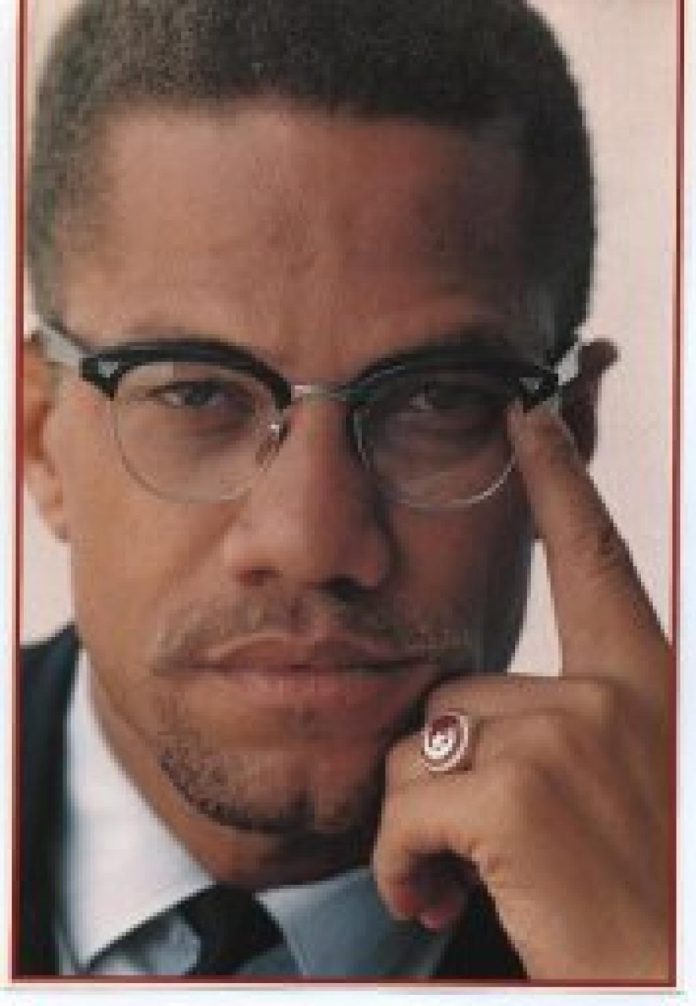
Google Image
Levon Campbell III
Staff Writer
Malcolm X was a well-known Civil Rights Movement leader and supporter of Black Nationalism.
To this day, he is a celebrated figure for his accomplishments and all the work he did for African-Americans.
Malcolm X differed from some civil rights leaders of the time because he wanted black people to be segregated from their oppressors, but still have the same rights as white people.
Malcolm X was born Malcolm Little in 1925 in Omaha, Neb. According to www.history.com, his father, Earl Little, was a Baptist preacher and after the Ku Klux Klan threatened them, the family had to move to Lansing, Mich.
In 1931, Malcolm’s father was murdered and it was allegedly done by the Black Legionaries, a white supremacist group, but the authorities labeled his death an accident and denied his family benefits from his father’s death.
At the age of 6, Louise Little, Malcolm’s mother, had a nervous breakdown and Malcolm was sent to a foster home. Though Little was an intelligent student, he dropped out of school after the eighth grade and started selling drugs and at 21. He was sent to prison for larceny.
According to www.pbs.org American Experience, while in prison, Malcolm learned the teachings of Elijah Muhammad, head of the Lost-Found Nation of Islam, or Black Muslims, a nationalist group that identified white people as the devil.
Soon after Malcolm adopted the last name “X” to represent his rejection of his slave name and signify his lost ancestral surname.
Elijah Muhammad appointed Malcolm as the national representative of Islam, the second most powerful position in the Nation of Islam, during the 1950s and early 1960s.
As the principal spokesman for the NOI, Malcolm condemned whites for the oppression of African-Americans and he argued for black power, self-defense, economic autonomy, and encouraged racial pride with his famous quote “by any means necessary”.
According to www.history.com, this advocacy put him on the opposite path of Dr. Martin Luther King, Jr’s nonviolent approach to the growing Civil Rights Movement.
After King’s “I have a Dream” speech in 1963 in Washington, Malcolm remarked, “Whoever heard of angry revolutionists all harmonizing ‘We Shall Overcome’ while tripping and swaying along arm-in-arm with the very people they were supposed to be angrily revolting against?”
According to www.pbs.org, in December of 1963 after X spoke on the death of John F. Kennedy, Malcolm left the Nation of Islam for good, questioning Elijah Muhammad’s leadership and his suspicions that the NOI was built on top of lies.
A few months later, Malcolm traveled to Mecca, Saudi Arabia, where he underwent a spiritual transformation. According to PBS American Experience, he stated: “There were tens of thousands of pilgrims, from all over the world. They were of all colors, from blue-eyed blonds to black-skinned Africans. But we were all participating in the same ritual, displaying a spirit of unity and brotherhood that my experiences in America had led me to believe never could exist between the white and the non-white.”
Malcolm returned to America and renounced the teachings of the NOI along with having a new name: El-Hajj Malik El-Shabazz.
In June of 1964, he founded the Organization of Afro-American Unity, which identified racism as the enemy, not the white race. His philosophy became more influential, especially among members of the Student Non-Violent Coordinating Committee.
On February 21, 1965, Malcolm X was assassinated by three gunmen at an Organization of Afro-American Unity rally in New York City. It is believed that the assassins were from the Nation of Islam. His work would lay the groundwork for many Black Pride Movements, including the Black Panther Party, according to PBS American Experience.
Jackson State students are familiar with Malcolm X’s accomplishments and believe that his actions were not wrong and that his ways were to help black people more.
Kyan Cooks, a junior computer engineering major from Atlanta, Ga., believes that Malcolm X’s approach was right to help African Americans.
“Some of his actions were justified and sometimes problems can be solved from violence,” she stated.
Trinity Cupitt, a freshman sociology major from Atlanta, Ga., believes that Malcolm did what was right for African-Americans at that time.
“He was trying his best for his people to be equal to white people and not settle for less,” Cupitt said.
In his autobiography, “The Autobiography of Malcolm X” published posthumously in 1965, Malcolm predicted he would be more important in death than in life, and even foreshadowed his demise in his book according to www.history.com.
The book, made with the help of Alex Haley, author of the novel “Roots”, inspired many film adaptations, including Spike Lee’s 1992 film “Malcolm X” which starred Denzel Washington.

